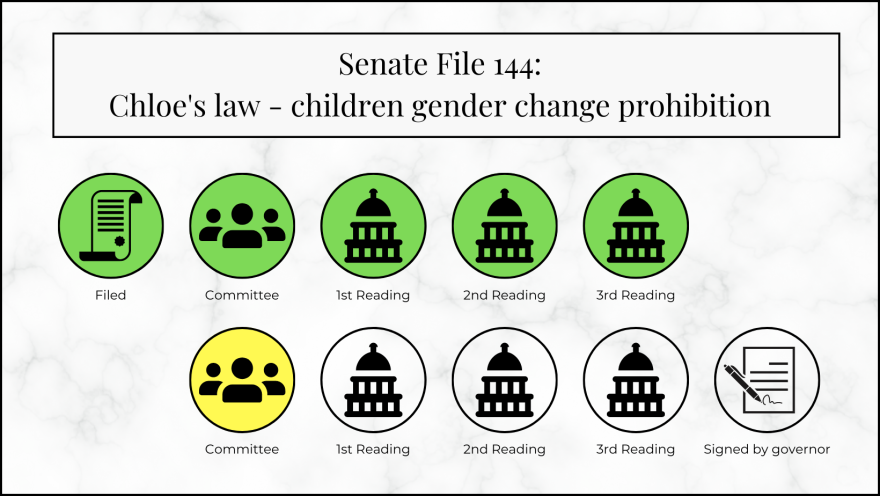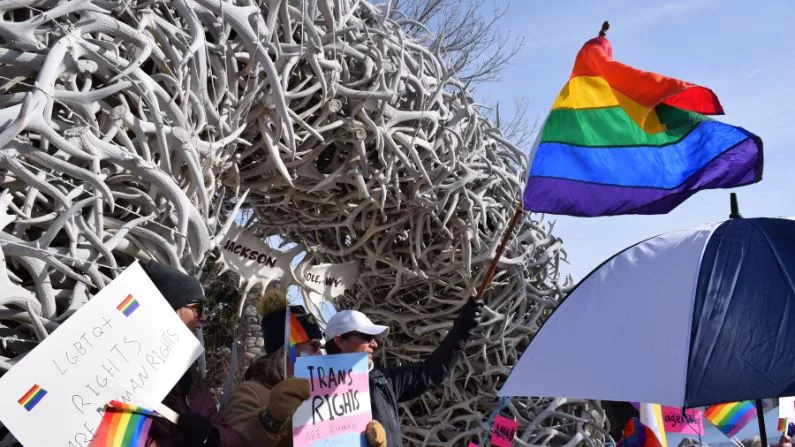This story comes through a content-sharing partnership with Wyoming Public Media.
As the Wyoming Legislature enters its seventh week, four pieces of anti-LGBTQ+ legislation are still in play. They have each cleared the Wyoming Senate and must now pass in the State House of Representatives if they are to become law.
Two of these bills seek to outlaw various forms of gender-affirming care. The third is a close copy of Florida’s much-discussed “Don’t Say Gay” bill and limits what teachers can say in the classroom about gender identity and sexual orientation.
Supporters say the bills are about stopping alleged assaults on children’s health and education — but the claims made by these supporters are at odds with the best available research in the fields they seek to legislate.
A fourth bill aims to ban trans girls and women from competing in female sports.
All four bills have been opposed by education officials, mental health professionals and queer Wyoming youth.
Laramie County teenager Ash Silcott told Wyoming Public Radio these bills are a matter of life and death for gay and trans kids in Wyoming.
“This is affecting real kids,” Silcott said. “We just want to be the people we want to be, and we want to feel love and acceptance. And we want to feel like we belong in this community, which is what every kid deserves: to feel like they belong.”
The push to pass these bills is not unique to Wyoming. Across the country, state legislatures have passed or could pass similar bills aimed at limiting gender-affirming care or the rights of queer youth.
Two of these bills are waiting to be introduced in the House, while the other two have already been assigned to a committee. The deadline for all four bills to clear a House committee is Friday, Feb. 24.
Senate File 111 – Child abuse – change of sex

Senate File 111 passed out of the Senate and now awaits introduction in the House. A bill has to pass in both houses before it can be signed by the governor and made state law. (Jeff Victor/Wyoming Public Media)
This bill would outlaw most gender-affirming medical care. That includes giving or helping a child obtain hormone blockers, hormone therapy or gender-affirming surgery. It would be defined as felony child abuse, punishable by up to 10 years in prison.
During a Senate Labor, Health and Social Services Committee meeting last month, the bill was the subject of fierce debate. Senator Charles Scott (R-Casper) is the bill’s primary sponsor.
“What’s happening is that people are preying on young adolescents that are having that kind of confusion and persuading them the way to solve it is to get their sex changed to the other sex,” Scott told the committee.
Several of Scott’s statements were corrected by pediatricians and other medical professionals during the hour-plus of testimony that followed.
Bills of this nature are opposed by every major medical and pediatric association, and both the Wyoming Psychological Association and the State Academy of Pediatrics testified against it.
Andrew Rose, a Cheyenne pediatrician, said families and kids don’t start transition lightly or because it’s a fad.
“They don’t want to find themselves in that situation — why would they? Especially here in Wyoming?” he said. “And no, these kids aren’t just confused. They’re not immature, they’re not just in a state. Instead, they identify in a way that society tells them they shouldn’t. And of course that creates dissonance.”
The bill exempts surgeries done on intersex newborns. These surgeries are often undertaken in the United States to make a child’s genitals appear more male or more female, but international human rights organizations call them “medically unnecessary.”
The bill advanced out of committee with a 3-2 vote and passed on the Senate floor with a 22-9 vote. It’s now awaiting introduction in the House.
Senate File 144 – Chloe’s law – children gender change prohibition

Senate File 144 passed out of the Senate and has been assigned to the House Appropriations Committee. A bill has to pass in both houses before it can be signed by the governor and made state law. (Jeff Victor/Wyoming Public Media)
Sponsored by Sen. Anthony Bouchard (R-Cheyenne), “Chloe’s law” also seeks to stop healthcare providers from offering gender-affirming care. It differs from Senate File 111 in that it would not make providing that care a felony, nor would it criminalize parents who seek such treatment for their children. Instead, the bill provides for the revocation or suspension of a healthcare provider’s license in the event that they provide hormone blockers or surgery to anyone under the age of 18.
Hormone blockers temporarily delay the onset of puberty and are widely accepted in the medical community as treatment for gender dysphoria in kids. Puberty blockers allow time for a child to determine if their gender identity is persistent and decide whether they want to keep transitioning.
Wyoming medical professionals and officials have testified repeatedly — on both this bill and Senate File 111 — that gender-affirming surgeries do not take place in Wyoming.
“Our physicians have repeatedly told this committee and others that these procedures are not being done in Wyoming,” Wyoming Medical Society Director Sheila Bush said. “I think the word ‘mutilated’ was used. Some very sad and concerning words have been used around this topic. And your own physicians in this state have told you repeatedly they are not doing this to children.”
But Bouchard and others said Wyoming should be proactive in banning the practice before it does come to Wyoming.
“If they’re not doing it, then why would you oppose the bill?” he said.
Much of the argument in favor of the bill hinges on the testimony and stories of “detransitioners” — individuals who underwent gender-affirming surgery only to regret it later. This is extremely rare. A meta-analysis found that just 1% of those who got a surgical transition ended up regretting their choice while the overwhelming majority did not.
A much more common outcome is an increase in quality of life. Gender transition — and simply having access to gender-affirming care — reduces depression and suicidal thoughts among transgender people young and old.
But Bouchard and others who support the bill have signal-boosted the stories of the 1% who regret their choice. During the committee meeting in which his bill was discussed — and after being prompted by a public commenter — Bouchard admitted to launching a nonprofit organization to pay for testimony from out-of-state detransitioners.
According to Secretary of State filings, he founded the nonprofit alongside Sen. Dan Laursen (R-Powell) and Sen. Troy McKeown (R-Gillette).
“It’s going to come out; I want to say it here,” Bouchard said. “We formed an outside entity called Senate Conservative Leadership Caucus. We raised money and we want to continue to help make sure there’s testimony, make sure this bill advances.”
That nonprofit was formed in January, four days before the testimony it funded appeared in committee.
Those who testified said children are being pressured into transitioning by doctors and cultural expectations. But opponents again reiterated that transgender children and their parents are not consenting to surgery — or even starting hormone blockers — on a whim.
“The argument being made against this gender-affirming care is always under the assumption that people are just doing this willy-nilly,” testifier and parent Marcie Kindred told the committee. “Nobody’s making this decision on the fly just because their kid saw a TikTok. That’s not how it’s happening. Trust our parents. Trust our physicians.”
Senate File 144 advanced out of committee with a 5-0 vote and sailed through the Senate with a 26-5 vote on third reading. The bill has been assigned to the House Appropriations Committee, which has scheduled a hearing for the bill on Tuesday.
Senate File 117 – Parental rights in education

Senate File 117 passed out of the Senate and now awaits introduction in the House. A bill has to pass in both houses before it can be signed by the governor and made state law. (Jeff Victor/Wyoming Public Media)
Another bill that has Wyoming’s LGBTQ+ community concerned is Senate File 117. It’s a close copy of Florida’s much-discussed “Don’t Say Gay” law.
The text of the bill forbids teachers from offering instruction on sexual orientation and gender identity in K-3 classrooms. It also requires school districts to notify parents about changes in their child’s “mental, emotional or physical health.”
Innocuous in its wording, the bill’s supporters say they don’t see how the bill could possibly discriminate against queer youth.
But education officials and queer youth themselves told lawmakers that banning classroom discussion might prohibit students from talking about their own families (if, for example, they have two dads or two moms), and the hardline requirement that districts tell parents everything about their kids would force districts to out gay or trans students.
Ash Silcott, the Laramie County teenager, said many queer students find that their classroom is a safer place to come out than their home. Silcott said they personally had support outside of school.
“But sometimes kids in our school district don’t get that,” they told the Senate Education Committee during its meeting Jan. 20. “They don’t get support at home that I was so lucky to receive. I’ve almost lost so many friends to suicide because they come to school and say, ‘My parents don’t love me.’ ‘My parents won’t love me if I come out to them. I can’t say anything.'”
Opponents said the “Don’t Say Gay” bill would stifle free speech and further stigmatize a subset of kids that already face intense prejudices. Tate Mullen of the Wyoming Education Association told the committee that this stigmatization feeds into the higher rates of depression and suicide experienced by queer and especially trans youth.
But supporters of the bill said they saw it as necessary for defending parental rights. During the same Senate Education Committee meeting, Laramie County Moms for Liberty Chair Kathy Scigliano and Vice-Chair Erin Waszkiewicz both spoke in favor of the bill and argued it didn’t go far enough.
Moms for Liberty is a national campaign that’s been working to ban books about LGBT issues and race from school libraries across the country.
Waszkiewicz said the bill should apply to all grades and not cut off at third grade. She also compared being transgender to living with an eating disorder.
“If a child is showing signs of bulimia, no one would ever encourage that child to continue to throw up their food and teach them how to hide it from their parents,” Waszkiewicz said. “Yet, this is exactly what’s happening with gender ideology. Therapists, counselors and doctors are using affirmative care instead of trying to find the root of the issue.”
She added children should never be given a health screening, survey or questionnaire without the expressed permission of their parents.
But Mullen of the Wyoming Education Association said that was a bad idea. He said health screenings in school can alert adults outside the family to child abuse occurring in the home. Mullen said if parents have the ability to opt their children out of basic health screenings and questionnaires at school, abusive parents will take advantage of that.
The bill advanced out of committee on a 4-1 vote. It passed on the Senate floor with an 18-12 vote and is now awaiting introduction in the House.
Senate File 133 – Student eligibility in interscholastic sports

Senate File 133 passed out of the Senate and has been assigned to the House Education Committee. A bill has to pass in both houses before it can be signed by the governor and made state law. (Jeff Victor/Wyoming Public Media)
This bill would prohibit students assigned male at birth from competing in women’s sports — in other words, banning trans girls and women from playing on teams consistent with their gender identity.
The bill does not ban the reverse — trans boys or men from competing on male teams — nor does it ban trans students from taking part in co-ed sports or joining sports teams that don’t compete against other schools.
Further, the bill establishes a commission, its members appointed by the governor, that would make determinations about an individual student’s eligibility for competing on certain teams.
Like the “Don’t Say Gay” bill, Senate File 133 advanced out of the Senate Education Committee with a 4-1 vote. It then passed on the Senate floor with a 28-3 vote. The bill has been introduced in the House and assigned to the House Education Committee, but the committee has yet to schedule it for a hearing.





